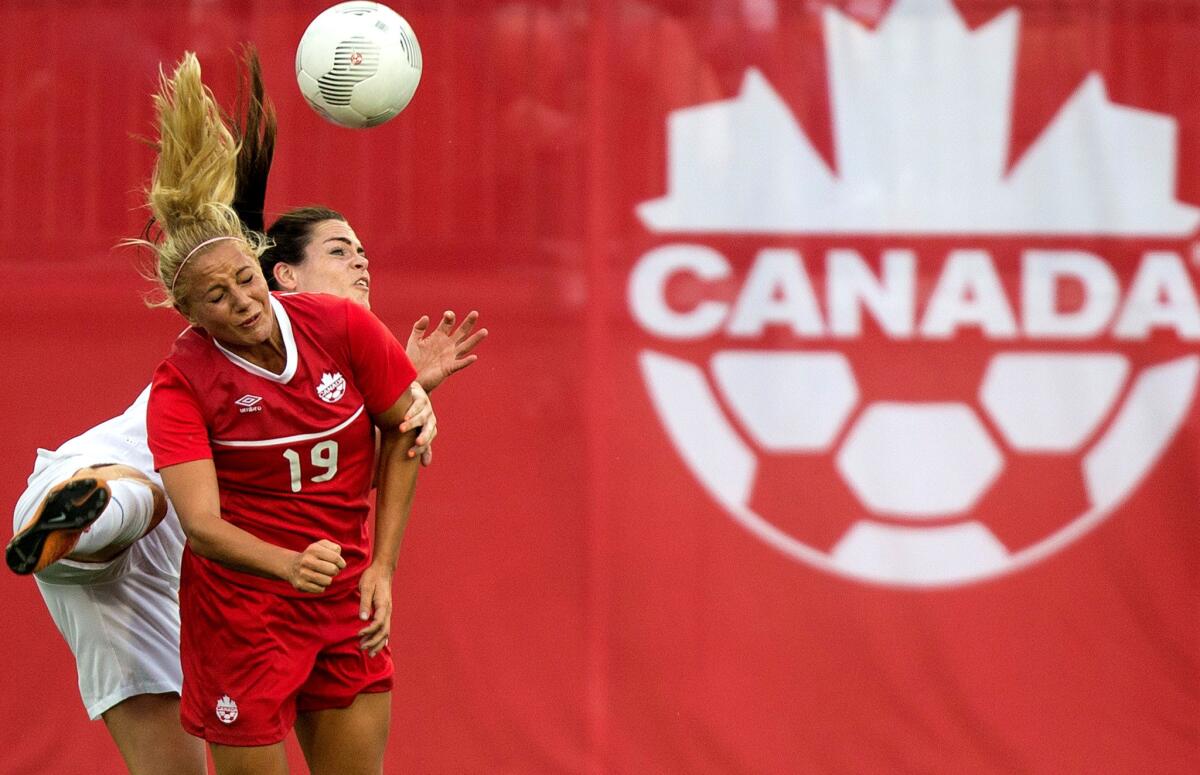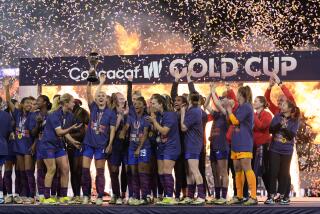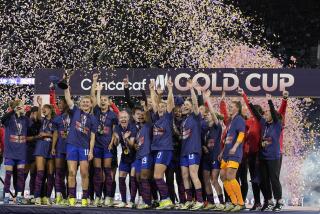Women’s World Cup vs. FIFA scandal: The battle to change the narrative

Canada’s Adrianna Leon (front) and England’s Claire Rafferty collide as they attempt to head the ball during an exhibition game on May 29 in Hamilton, Canada.
The deepest World Cup field in women’s soccer history will kick off Saturday in Edmonton with pomp despite the circumstances.
Pomp because the tournament, which opens with host Canada meeting China, is also the longest and largest women’s World Cup. Yet the circumstances aren’t entirely celebratory, with the games starting four days after FIFA President Sepp Blatter announced he would step down amid a widening criminal investigation of corruption in global soccer’s governing body.
As a result neither Blatter nor his chief aide, secretary general Jerome Valcke, showed up at the final pre-tournament news conference in Vancouver on Thursday. But they were there in spirit, with reporters peppering officials with wave after wave of questions about the ongoing scandal, leading FIFA media relations manager Segolene Valentin to step in and ask whether anyone wanted to know anything about the actual tournament.
Apparently no one did. So it fell to Victor Montagliani, president of the Canadian Soccer Assn., to try to wrest the focus back on the games.
“It’s a positive thing that the first tournament after this, whatever happened in the last week, is the women’s World Cup,” he said. “I think women’s football can shine some light on the dark clouds that are hanging over the game.”
The tournament will have to be a rousing success to do that. And judging from the ticket sales, soccer fever hasn’t exactly gripped Canada.
Two days before Saturday’s tournament opener, more than 5,000 tickets were unsold. And demand for tickets has been so slow in tiny Moncton, the most remote of the six World Cup cities, prices at the 15,000-seat stadium for a group-stage games dropped to $5 a seat.
In Winnipeg, where next Friday’s game between the U.S. and Sweden sold out in March, it’s a different story. Well, sort of.
The Americans’ group-play opener Monday, in Winnipeg, is also expected to sell out, as have virtually all the city’s hotel rooms. But the farther you stray from Investors Group Field, where the games will be played, the more the tournament fades from view.
No banners. No billboards. And among the locals, no interest.
“I didn’t even know it was happening until I saw it on Google,” said Rick Harrison of Winnipeg. “This is not really a soccer town.”
“I think it’s a lot of people from outside,” Nick Moran, another local, said as he checked in guests Friday at a sold-out budget hotel near the airport. “I really don’t care.”
A co-worker smiled and nodded in agreement.
With the women’s tournament expanding to 24 teams and 52 games, organizers had hoped to sell 1.5 million tickets, almost twice as many as were sold in Germany four years ago, when there were 20 fewer matches. They may have to resort to some fuzzy math to make that happen.
Canadian soccer officials said Thursday 920,000 tickets have been sold, but that’s misleading because many of the group-stage matches will be played as doubleheaders, with FIFA counting each person through the turnstile twice even when one ticket includes admission to both matches.
Four years ago it seemed the women’s game had passed the point where it had to fight for attention and respect through creative ticket-counting. Nearly 63 million TV viewers in 181 countries — including more than 14 million in the U.S. — watched Japan beat the U.S. on penalty kicks in the 2011 World Cup final, FIFA said. And a Twitter record was also set that day with 7,196 tweets per second.
But the momentum didn’t last, leaving the women’s tournament lagging well behind the men’s World Cup in several areas. Last summer in Brazil, for example, FIFA paid out $406 million in prize money. The top teams in Canada will share about 3.3% of that, with the total purse of $13.6 million less than what FIFA paid each of the eight men’s quarterfinalists.
FIFA also insisted this World Cup be played entirely on artificial turf, something it has never tried with the men’s event. More than 60 top women players, led by U.S. stars Abby Wambach and Alex Morgan, challenged that decision before the Human Rights Tribunal of Ontario, charging FIFA and the Canadian Soccer Assn. with gender discrimination.
Six months ago, after FIFA and Canadian soccer held fast to their demands, the players withdrew their complaint rather than risk delaying the World Cup.
But now, with the opening game just hours away, FIFA has once again steered the spotlight away from the fields and into a courtroom.
“As succinctly as I can put it, I see FIFA right now as the stadium that houses our game,” U.S. Coach Jill Ellis told reporters before her team’s first practice in Winnipeg on Wednesday. “They organize it, they put it together. But in terms of what happens inside, with the teams, the players, the passion, that should be the focal point.
“I just see FIFA as the stadium where we play.”
Meanwhile U.S. midfielder Heather O’Reilly, searching for something positive in the scandal, thought she may have found a silver lining to the dark clouds Montagliani had said were obscuring the game.
“You know, there’s a lot of talk about soccer right now,” O’Reilly said. “Maybe that will get people to watch this amazing tournament.”
Twitter: @kbaxter11







